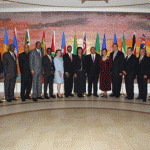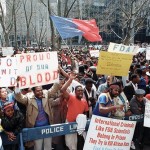President Hugo Chavez’s announcement that he had surgery to remove a cancerous tumor has shaken up Venezuelan politics ahead of what was already looking like a tight race for the 2012 election.
In an emotional speech from Cuba where he said he is recovering, the 56-year-old socialist did not give a timetable for his return to Venezuela and did not name a temporary leader. Here are some implications of his announcement:
* Analysts have long said Chavez has no obvious successor and a prolonged absence could unleash in-fighting among his allies. None of the senior figures in his government have anything like his charisma or national appeal. Ministers came out minutes after Chavez in a joint TV appearance with a pledge of unity and a vow to “deepen” his reforms. Nationalizations and presidential decree powers have been among his most controversial policies.
* The focus will also now turn to the opposition, who had been hoping to unseat Chavez at a presidential election due to be held late next year. They have tried to avoid being seen to exploit his condition and opposition leaders contacted by Reuters after Chavez’s speech said they preferred not to make public comments immediately. They could begin to demand an early poll if Chavez stays off the political stage much longer. Even if not, they will be hoping the situation enhances their electoral prospects despite the personal sympathy Chavez will undoubtedly receive from many Venezuelans.
* The favorite to win the newly-united opposition bloc’s presidential ticket at primaries due to be held in February, 38-year-old state governor Henrique Capriles Radonski, has said he wants Chavez fit and healthy for a fair fight in front of the Venezuelan voters and political change via the ballot box.
* If Chavez were incapacitated and unable to serve, under the constitution he should in theory hand power to Vice President Elias Jaua to serve the remainder of six-year term, ending in January 2013. Jaua has been the most prominent face of the government during Chavez’s absence and one of the president’s closest allies for many years. He is also seen as dogmatic and deeply committed to their Socialist Party’s left-wing ideals. There has been no suggestion by Chavez, however, of him relinquishing office.
* Venezuela’s widely-traded bonds are likely to rise on Friday. Wall Street views Chavez’s health problems as giving the opposition a better chance to win next year’s election and introduce more business-friendly policies that will be better for investors in the long-term. Some have predicted “regime change” in Venezuela could easily compress credit spreads around 500 basis points.
* Other analysts caution, however, that the implications of a power vacuum remain far from clear, and that the potential for chaos in the already turbulent nation of 29 million is high, at least in the short term. Given violence in the past, especially around a short-lived coup against Chavez in 2002, the potential for more bloodshed is never far away in a nation awash with guns and plenty of political grudges.
* Chavez’s hosts Cuba will be anxious over the implications for them. The communist-run Caribbean island’s ailing economy depends heavily on oil subsidized from Venezuela. That is true too for some other nations in Central America and the Caribbean including Nicaragua and the Dominican Republic. Opponents of Chavez have long vowed to scrap what they call a reckless giveaway of the country’s resources if they get a sniff of power. Chavez allies too are known to be less enthusiastic about the close ties with Cuba and expensive subsidies around the region than Chavez himself.
* Regarding the specific medical condition, Chavez insisted he was heading toward “full recovery”. He said the tumor was removed but treatment still ongoing, which could mean just checks and recuperation, but could also imply chemotherapy. He gave no detailed clinical prognosis for his recovery or timetable for return, implying his recovery was an open-ended process. That could fuel opposition demands for him to name a temporary replacement. They have accused him of showing his autocratic streak by trying to rule from his sick bed in Havana, where he has been signing laws and calling ministers.
* Chavez’s announcement will undoubtedly spark a wave of emotion and sympathy among his fanatical supporters, especially in the shanty towns that are his power-base. While opposition leaders have wished him well in public, the many Venezuelans who hate Chavez’s government have been privately saying they hope his health problem will force him from office. Last year’s parliamentary elections showed the nation pretty much split down the middle between Chavez fans and foes.
 Nassau (Bahamas): le gouvernement dominicain viole le droit international, déclarent les leaders de la Caricom
Nassau (Bahamas): le gouvernement dominicain viole le droit international, déclarent les leaders de la Caricom A court ruling to deny citizenship to Haitian Born in Dominican Rep.
A court ruling to deny citizenship to Haitian Born in Dominican Rep. Cruise Company Blames Captain .
Cruise Company Blames Captain .
Leave a Reply